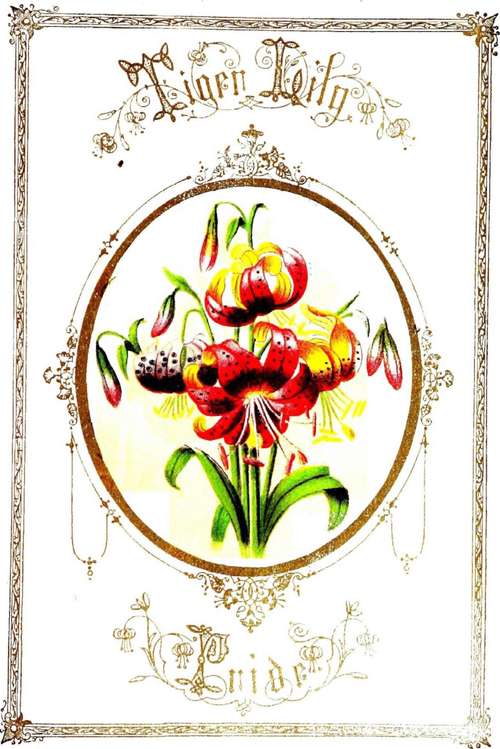The Tiger Lily
Description
This section is from the book "Garden Flowers". Also available from Amazon: Garden Flowers (1857 ).
The Tiger Lily
This flower is a native of China, and its gorgeous colouring partakes not little of the warm richness of the sunny clime whence it comes. It was brought to this country in 1804, and since then, has become an ornament in most of our gardens and nurseries. It flowers in September and October, and, although our skies are less frequently gladdened with the warm sunshine*that characterises those under which the Tiger Lily originally grew, it flourishes well, and is considered a hardy plant. Many other kinds of lilies, on the contrary, are extremely tender, and puzzle our gardeners not a little, some of whom say that they will not flower in pots, while others assert that they do not flourish if planted in free ground. Some recommend shade and moisture ; and others, an open situation exposed to sun and air.
Although the rich and variegated colours of the Tiger Lily claim our admiration, it is not so generally known as many of .the other species of this flower. Our ordinary conceptions of lilies are, grace and purity united to delicacy of perfume, and an absence of glaring colour. The white lily is an especial favourite, and the lily of the valley,
"That lowly floweret sweet and pule Which loves to hide in lonely vale,' has drawn forth the admiration of poets and the lovers of nature in all generations.
But the name of the lily has been embalmed in a more enduring record than the books and ballads of human poetry. In the inspired volume we are told to " Consider the lilies how they grow." We are not, indeed, quite certain which of the numerous varieties of this honoured flower was alluded to by our Saviour, and some are disposed to think it was the golden lily of the East; but, whichever it was, this imperishable eulogium was pronounced upon it:— " Solomon in all his glory was not arrayed like one of these.'7 Thomson in allusion to this says:—

" Observe the rising lily's snowy grace; Observe the various vegetable race, They neither toil nor spin, but careless grow, Yet see how warm they blush! how bright they glow! What regal vestments can with them compare? What king so shining, or what queen so fair?"
Continue to:
- prev: The Iris
- Table of Contents
- next: The Carnation
